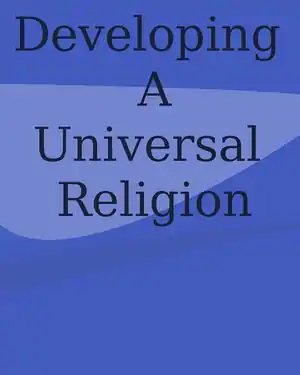
Since the universe behaves in a reasonably predictable way, life forms able to correctly predict forthcoming events have a survival advantage. Sentient beings, able to plan ahead before acting, behave rationally when they predict a situation and make decisions that, when acted upon, help to achieve the chosen purpose.
As well as rational decisions, human beings also use instinct and emotion, a 'quick and dirty' decision process based on successful habits. According to the meta-science of evolutionary psychology, religion is a survival tool, an attempt to develop those 'feelings' that help us survive — dealing with our neighbours, accepting certain constraints, and holding certain opinions, working together for some purpose such as world peace, international justice, or the glory of God is as much an emotional response to things that we find life-threatening as it is a rational response to 'making the world better'.
We might decide that "supporting life's journey for humanity to become an omnipotent Being (oB)" is a worthy goal, and we could make it our "meta-purpose" to guide moral decision making. However, this is too loose a statement for many practical purposes. While it might convey some emotional desires or feelings, it is not precise enough to guide the moral (and therefore physical) behaviour of an entire civilization
A universal objective must be able to withstand all manner of challenges — legalistic, moralistic, religious, economic, scientific, rational, emotional, and many more. A clearly defined “universal purpose,” could turn wishful conjecture into tangible and beneficial practices. Moreover, if a “universal purpose” were to be derived from the concept of assisting the survival of our species, then a worthy but dry legal document such as the Universal Declaration of Human Rights can come to life by providing the vision empowering people to constructively criticise the powerful.
In eras past, religions took generations to develop, with emotions playing a large part. Nowadays a sound religion might be rationally grown in a decade or two, via electronic communications. As shown in the title of this book, the emphasis is upon the need to develop a universal religion, and where one might look, not upon actually doing so. Nevertheless, it seems appropriate to outline how such a fantasy might someday become a reality.
Part One: Thinking And Moral ProblemsThinkingSolving ProblemsMaking DecisionsPostscripts |
Part Two: Religions And Their SourceReligions' OriginsRevelations And ConversionsPresent Day ReligionsPostscripts |
Part Three: PurposeThe UniverseLifeLooking For A PurposeLife And Exploiting
Postscripts |
Part Four: DevelopmentWhy Bother?Possible ApplicationsDetermining Moral BehavioursA Universal ReligionPostscripts |